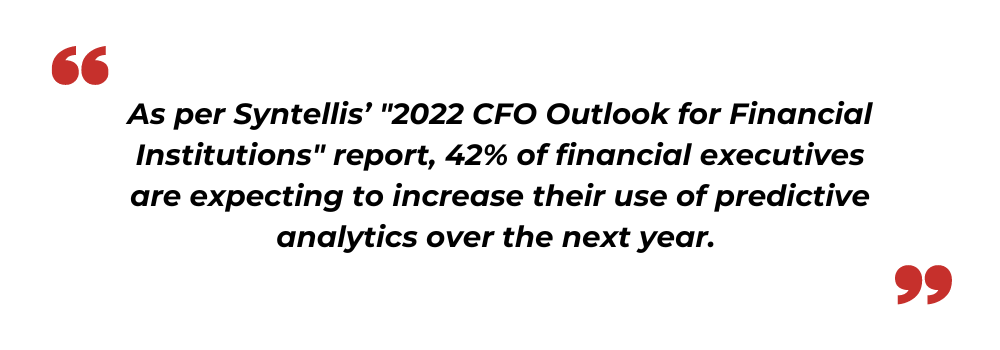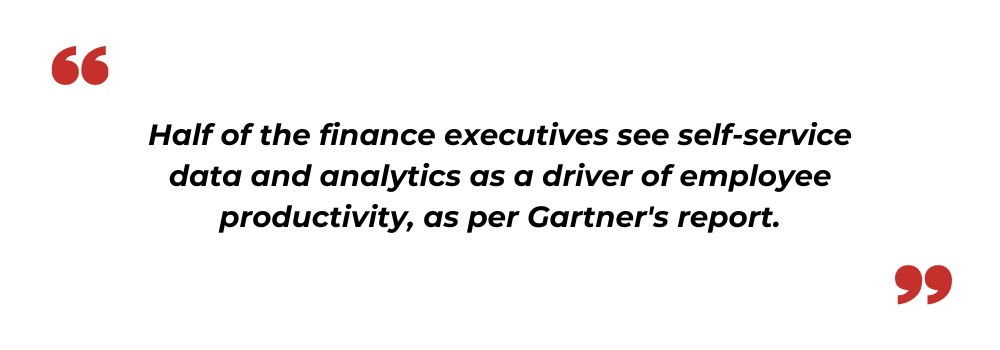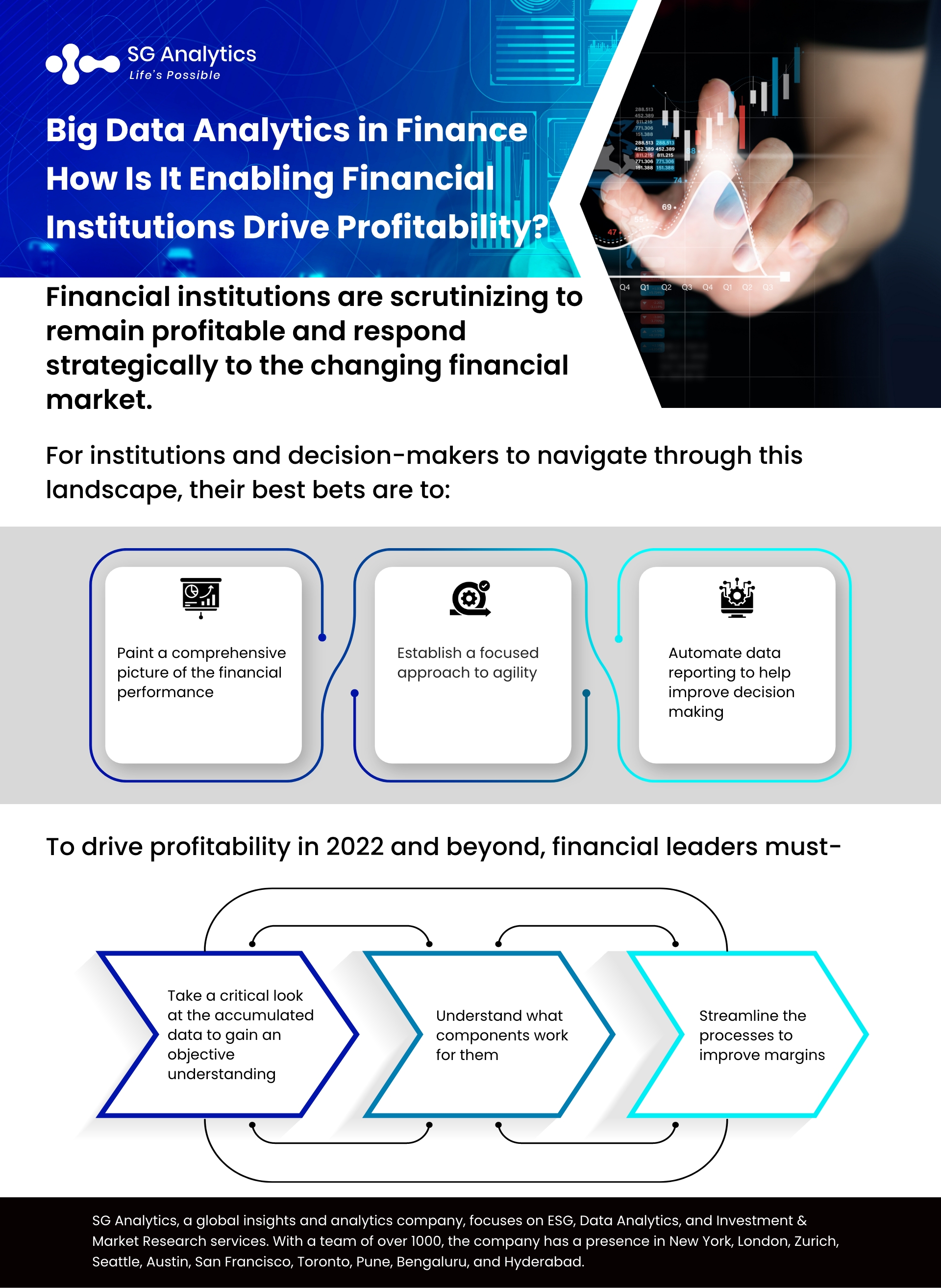Digitization in the finance industry is enabling technology, including big data, advanced analytics, machine learning, AI, and the cloud, to transform the way financial institutions compete in the market. Big corporations are embracing these technologies to incorporate digital transformation, meet consumer demand, and bolster profit and loss. However, while many are storing new and valuable data, they are not necessarily aware of how to maximize the potential as the data is unstructured.
Even before the advent of the COVID-19 crisis, market signs were pointing towards an increasing demand to extend efforts regarding digital enablement. However, the arrival of COVID-19 led to establishing a new bar that revealed servicing and automation inadequacies in real-time.
Read more: What Is Data Democratization? How is it Accelerating Digital Businesses?
Financial institutions that emerged as the early adopters of big data, analytics, and AI to automate their operations are already reaping the rewards. Smart banks that are exploring avenues to invest in the data-driven business will be better able to determine;
-
new products and services/ solutions
-
channels that are most likely being used by customers
-
correct pricing
-
the right marketing methods
-
a thorough analysis of which customers are willing to switch providers or have multiple providers

Today, massive volumes of data are collected by businesses daily. However, only a few have focused investment on data-driven business to leverage customer insight. This is specifically true of the banking sector, as it often lags when it comes to data-driven transformation.
Applications of Data-driven Analytics in Finance
-
Boosts revenue and customer satisfaction
-
Speeds up manual operational processes
-
Improves path to purchase
-
Streamlines workflow along with reliable system processing
-
Analyze financial performance as well as control growth
Considered to be legacy-bound institutions, it is unsurprising that financial institutions have always stayed behind the curve when it comes to digital transformation. Over the span of the last two years, banks and credit unions have worked to somehow manage the complex and unpredictable economic landscape, as many digital modifications were refocused on digital consumer-facing products.
Financial institutions are scrutinizing to remain profitable and respond strategically to the changing market factors, investing in digital transformation as well as leveraging data to deliver a competitive advantage.
Read more: It's Time to Put Marketing at the Data Table. Why?

Achieving the Set Business Priorities
While change is considered the only constant, it is equally true that we are in it for the long haul. From setting standards to frameworks and rankings, financial institutions are employing practical solutions to transform their most critical priorities into measurable business results. Companies are investing in productivity and efficiency to fight inflation as well as to outperform their competitors. With CFOs exploring ways to fight the evident inflation’s impact on margins, data-driven analytics is proving to be a significant tool that will assist in driving employee productivity.
With the advanced data and analytics coupled with AI technologies, financial institutions are driving and delivering high value where investment is anticipated to increase. This includes self-service data-driven analytics, automated machine learning, big data analytics, cloud analytics, and predictive analytics.
Big data analytics and predictive analytics are perceived as the top technology categories to drive higher revenue through improving products or services. By leveraging the right data-driven technologies, businesses can accelerate their financial ecosystems. But for institutions as well as decision-makers to navigate through this landscape, their best bets are to:

-
Paint a Comprehensive Picture of the Financial Performance
As per the findings of Cornerstone Advisor’s What’s Going on in Banking 2022 study - while most financial institutions have launched their digital transformation strategies, only 20% are more than halfway through their planned framework. While incorporating as well as implementing a plan for data-driven profitability is vital, following through with the plan to the very end is the only way to witness results. By gaining visibility into the assembled data, financial leaders can confidently make the right choices for their organizations.
However, to gain this visibility, financial leaders must employ tools that turn data into actionable insights. The traditional processes to interpret reports on old systems exhibit the same over and over, making it hard to specify what is and is not working or what efforts are leading to improvements.
Today's cutting-edge technology integrates data from different systems and provides a single source of reality for all key performance metrics, along with interactive dashboards that make it easy for leaders to monitor performance.

The system also automatically updates reports with up-to-date insights. They offer role-based permissions for the data to be only visible to appropriate parties.
Read more: Data & Analytics Strategy: Must-Have Crucial Elements for Decision Making
-
Establish a Focused Approach to Agility
Agility and flexibility are vital skills for financial sectors. With focused data insights, bank and credit union leaders are navigating this dynamic and ever-changing marketplace. Financial institution leaders who anticipate and organize numerous possibilities are using more than instincts to better equip themselves and overcome unexpected challenges to lead their teams through the crisis. With robust financial and sophisticated analysis tools, leaders can significantly reduce the time spent modeling imaginary what-if scenarios ad take quick actions to help leaders make precise data-driven decisions that align well with the business goals and strategy.
Today, data is crucial for financial institutions to navigate swiftly through unpredictable times, along with staying agile and ahead of the onward digital transformation curve to minimize business disruption. Without these data-driven insights, decision-makers will be left in the dark when it comes to formulating and acting on the next steps.

-
Automate Data Reporting to Help Improve Decision-making
As per the CFO report, 62% of financial institution leaders are incorporating operations to pull data from diverse sources into a single report. But it is being considered their biggest reporting challenge. With the right software solution, enterprises can eliminate this challenge in order to maximize efficiency, reduce errors as well as ensure the availability of timely information. This automation decision will enable businesses to streamline their operations and empower the most valuable resources to spend more time serving consumers and generating revenue.
Reporting and analysis tools can assist in validating data accuracy as well as make it easy to scrutinize trends, disclose business plans, forecast, manage, and measure profitability. Businesses should explore a solution to regularly refresh data and avoid making decisions based on outdated insights. Financial leaders need to stay up to date with the latest security protocols as well to avoid costly data breaches.

Now is the right time for financial institutions to embrace and incorporate advanced technology and leave behind manual processes of operations. With data-driven insights, financial leaders can prepare to evolve the way they function. As per Syntellis’ "2022 CFO Outlook for Financial Institutions" report, nearly 42% of financial leaders are anticipating boosting their use of predictive analytics in the coming years or so. 30% of the participants anticipated using artificial intelligence, and almost 26% intended to invest in machine learning.
While many institutions are still facing the challenges of navigating this ever-evolving financial landscape, they are taking measures to set themselves up for triumph in the long run.
Read more: Data-Centricity: The New Roadmap to Driving Enterprises in a Changing World

In Conclusion
Today, the financial sector is deemed as one of the most data-intensive in the entire economy. While many financial institutions have invested heavily in collection and processing technological innovations for the volumes of data they generate, only a few are employing big data techniques to unlock meaningful insights to deliver pro-active experiences to consumers that help in driving loyalty and generate higher revenues.
Banking customers' expectations are rising as they are more inclined to build trust and be frictionless. Financial institutions are incorporating 24/7 multi-channels for smooth customer-centric experiences. For banks to deliver on this, in-depth customer insights are vital. These insights can only be uncovered by incorporating data mining and adaptive and predictive analytics with AI to gain more actionable insights.
However, for financial institutions to drive profitability in 2022 and beyond, financial leaders must take a critical look at the accumulated data to gain an objective understanding of the financial position, what components work for them, and how to streamline the processes to improve margins. With the right investment in the right data-driven tools, financial executives must leverage this immensely valuable data and drive decisions with confidence to discover what the future holds.
With a presence in New York, San Francisco, Austin, Seattle, Toronto, London, Zurich, Pune, Bengaluru, and Hyderabad, SG Analytics, a pioneer in Research and Analytics, offers tailor-made services to enterprises worldwide.
A leader in Data & Analytics, SG Analytics focuses on leveraging data management & analytics and data science to help businesses discover new insights and build strategies for business growth. Contact us today if you are an enterprise looking to make critical data-driven decisions to prompt accelerated growth and breakthrough performance.









